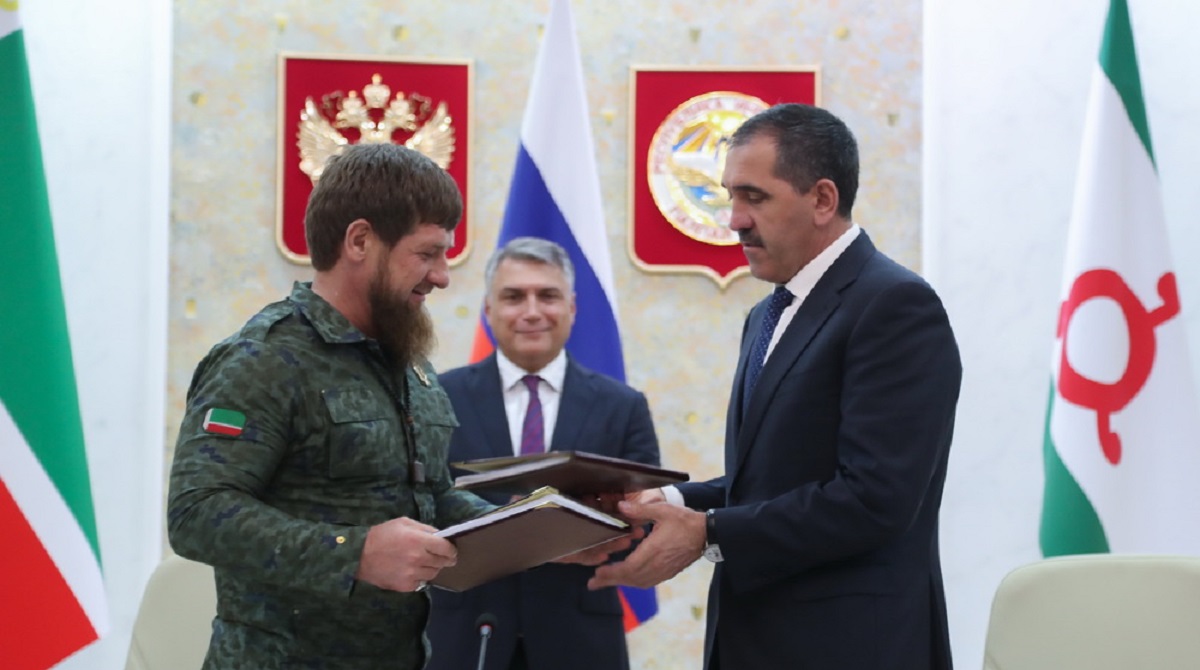

The Constitutional Court of Russia has ruled that a controversial land deal between the Russian republics of Chechnya and Ingushetia is legal, contradicting an earlier judgement by Ingushetia’s constitutional court that it was not.
The court issued its verdict on Thursday, after an appeal from the head of Ingushetia, Yunus-Bek Yevkurov, against the Ingush court’s decision.
The head of the Ingush constitutional court, Ayup Gagiyev, boycotted the hearings arguing that the federal court had no jurisdiction over its decisions.
The land deal was signed on 26 September by Yevkurov and his Chechen counterpart, Ramzan Kadyrov.
The Ingush court ruled on 30 October that the border deal violated Ingushetia’s constitution, as a referendum was required in order to adopt it.
According to the agreement, Ingushetia will transfer 340 square kilometres (about 9% of its territory) to Chechnya.
The agreement, and a subsequent bill in the Ingush parliament approving it, sparked large protests in Ingushetia.
Speaking at the Sixth North Caucasian Media Forum in the Chechen capital, Grozny, Kadyrov said the federal court’s decision was fair and claimed that ‘the administrative border is not a line of disengagement between peoples’, Russian news agency Interfax reported.
‘Praise to the Almighty, we can draw a line under this question. There may be no other solution, since before signing the agreement, consultations with lawyers of both regions took place’, Ingush news site Bakdar quoted Kadyrov as saying.
According to him, the agreement had historical significance and eliminated forever a cause that could be used by ‘the enemies of the Chechen and Ingush peoples’, because ‘there are certain people who wanted to use this moment in their personal interests and bring discord between these fraternal people’.
Kadyrov invited anyone to come and live in the area, to invest and develop it. He said he had previously made such a proposal, but so far no one had agreed.
At the same forum, Interfax quoted the head of Ingushetia, Yunus-Bek Yevkurov, as saying that he did not doubt the legality of the decision and intended to develop the territories jointly with the government of Chechnya, and said that the border between Chechnya and Ingushetia was only a formality.
Yevkurov noted on his Instagram page that one of the immediate tasks was to create rural infrastructure in the border area and improve living conditions, and he said that public councils in border settlements would participate in the development of the territory.
According to him, all initiatives would be coordinated directly with local residents.
Anger in Ingushetia
The Russian Constitutional Court’s ruling was met with widespread anger in Ingushetia.
The Ingush Committee of National Unity, which includes representatives of Ingush public organisations and teips (clans) vowed it would not stop protest activities against the deal.
In a statement published on Ingush news site Fortanga, the committee said that following the court’s ruling, ‘the Ingush people understood that the federal centre was ready to insult the honour of an entire people in order to please their vassals’.
‘We responsibly declare that we will fight till the end using all possible legal and accessible mechanisms to preserve and restore the territorial integrity of Ingushetia.’
The committee declared it would ‘continue the struggle for justice and the territorial integrity of the Republic of Ingushetia’, not only on in the territorial dispute with Chechnya, but also a separate dispute with North Ossetia.
The statement said the group planned to ‘step up work’ on ‘returning the Prigorodny District to Ingushetia.’
Prigorodny District was transferred to North Ossetia following the deportation of the entire Chechen and Ingush populations of the North Caucasus to Central Asia in 1944.
According to human rights activist Magomed Mutsolgov, a member of the committee, the Russian Constitutional Court’s ruling did not come as a surprise to Ingush activists.
Mutsolgov told OC Media that according to the law, the court should never have accepted the appeal from Yevkurov in the first place.
‘Only the supporters of the agreement were allowed to the court,’ he added.
Mutsolgov confirmed that they planned to contest the agreement in international structures including the OSCE, UN, and the League of Islamic States.
Zakri Mamilov, an MP in Ingushetia’s parliament, told Caucasian Knot that this ‘political decision will be appealed in international instances.’
Ruslan Mutsolgov, head of the Ingush branch of Russian opposition party Yabloko, said that a ‘dangerous precedent’ had been set, and that the decision was made in order to please certain officials.
According to Mutsolgov, Kabardino-Balkaria, Adygea, Stavropol Krai, and Daghestan could all suffer because of this ruling.
Chechen ‘claims’ on Daghestan
Also at the North Caucasian Media Forum, the head of Daghestan, Vladimir Vasilyev, announced talks that day with Chechen head Ramzan Kadyrov to discuss the border between Daghestan and Chechnya, Daghestani daily Chernovik reported.
According Vasilyev, discussions would aim not at strengthening the borders and regime, but at creating good conditions.
‘We will consider them very carefully, communicating, if possible, with each resident’, Chernovik quoted him as saying.
In addition to restoring Daghestan’s Aukh District, a historically ethnic–Chechen district that was abolished after the 1944 deportations, there has been widespread speculation online and in local media that Daghestan’s Botlikh District, which borders Chechnya, will be discussed.
[Read on OC Media: Controversy over Chechen Aukh District resettlements continues in Daghestan]
Daghestani newspaper Novoye Delo reported that a new map published on the Chechen parliament’s website on 8 November showed a part of Daghestan within Chechnya.
On the map, the entirety of Lake Kezenoy-Am, located on the border of the Vedeno District of Chechnya and the Botlikh District of Dagestan, and part of the area near the village of Ansalt in the Botlikh District were shown as being a part of Chechnya.
Following the report, the map was taken down and Chechen authorities said it had been a mistake.









